综合英语教程1第三版
综合英语教程(第三版)BOOK1-课文译文08.第八单元
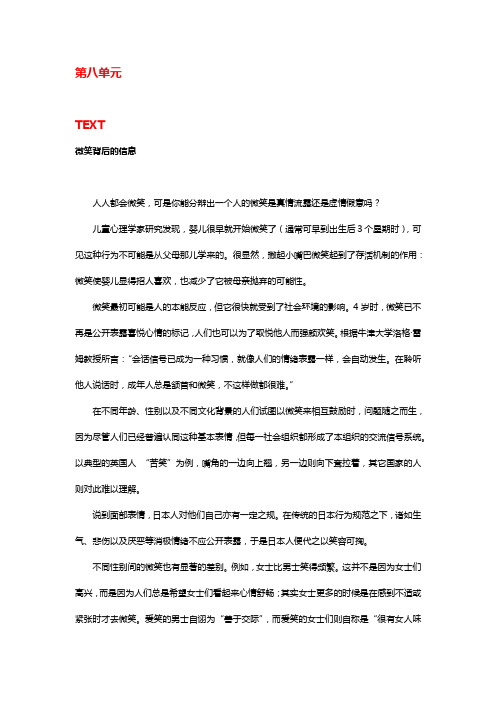
第八单元TEXT微笑背后的信息人人都会微笑,可是你能分辩出一个人的微笑是真情流露还是虚情假意吗?儿童心理学家研究发现,婴儿很早就开始微笑了(通常可早到出生后3个星期时),可见这种行为不可能是从父母那儿学来的。
很显然,撇起小嘴巴微笑起到了存活机制的作用:微笑使婴儿显得招人喜欢,也减少了它被母亲抛弃的可能性。
微笑最初可能是人的本能反应,但它很快就受到了社会环境的影响。
4岁时,微笑已不再是公开表露喜悦心情的标记,人们也可以为了取悦他人而强颜欢笑。
根据牛津大学洛格·雷姆教授所言:“会话信号已成为一种习惯,就像人们的情绪表露一样,会自动发生。
在聆听他人说话时,成年人总是颔首和微笑,不这样做都很难。
”在不同年龄、性别以及不同文化背景的人们试图以微笑来相互鼓励时,问题随之而生,因为尽管人们已经普遍认同这种基本表情,但每一社会组织都形成了本组织的交流信号系统。
以典型的英国人“苦笑”为例,嘴角的一边向上翘,另一边则向下耷拉着,其它国家的人则对此难以理解。
说到面部表情,日本人对他们自己亦有一定之规。
在传统的日本行为规范之下,诸如生气、悲伤以及厌恶等消极情绪不应公开表露,于是日本人便代之以笑容可掬。
不同性别间的微笑也有显著的差别。
例如,女士比男士笑得频繁。
这并不是因为女士们高兴,而是因为人们总是希望女士们看起来心情舒畅;其实女士更多的时候是在感到不适或紧张时才去微笑。
爱笑的男士自诩为“善于交际”,而爱笑的女士们则自称是“很有女人味儿”。
无论出于什么原因,微笑的人总比板着面孔的人更具吸引力。
这也正是一些不懂微笑的孩子经常被同伴们冷在落操场一边的原因。
在美国,社交技能课程更侧重教授不善交际的孩子如何把握尺度面带微笑。
据说效果甚佳。
(高全孝译,张校勤校)READ MORE眉目传情眼部动作,包括各种目光对视,可以传递人们在日常生活中能捕捉到的许多微妙的信息。
热切的目光或是冷漠的盯视胜过千言万语。
目光相迎或是目光相避会产生独特的效果。
大学体验英语综合教程1(第三版)-课文unit2
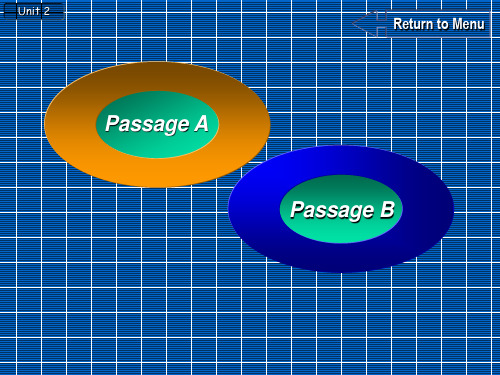
vision n. — 1) the ability to see
— 2) an imagined mental image of sth Example • He has very little vision in her left eye. Example • Since he has frombe. memory loss That’sthe myaccident, vision of how thesuffered world could and impaired vision. • I have a vision of a society that is free of exploitation and injustice.
always wishing and hoping, but never giving it a chance to happen. He
nurses the flickering dream, but never lets it break out into flame.”
Most of us have a dream, aspiration, or heart’s desire. But the trouble is most of us have the on / off switch of our dream set to OFF. Whenever we say, “I can’t,” we set the switch to OFF. Whenever we believe we can, we set the switch to ON. Simple, isn’t it? Just because I believe I can do something doesn’t mean there won’t be any problems. But once I believe I can do it, I will seek solutions for every problem I stumble on. And since it is a law of life that we find what we look for, if I look for solutions, I will find them. Any worthy dream is a dream accomplishing. Once I realize I can do it, the next step is to make a commitment. As soon as we make a commitment, great power is released. What seemingly were insurmountable hurdles are now reduced to obstacles of laughable insignificance.
综合英语教程1第三版课后答案
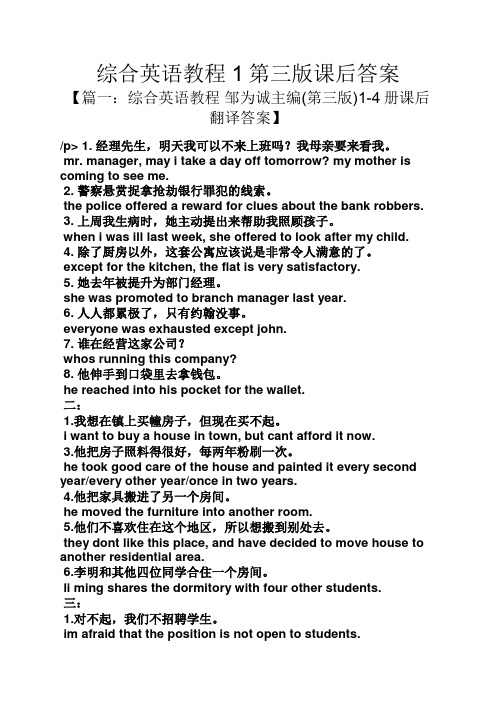
综合英语教程1第三版课后答案【篇一:综合英语教程邹为诚主编(第三版)1-4册课后翻译答案】/p> 1. 经理先生,明天我可以不来上班吗?我母亲要来看我。
mr. manager, may i take a day off tomorrow? my mother is coming to see me.2. 警察悬赏捉拿抢劫银行罪犯的线索。
the police offered a reward for clues about the bank robbers.3. 上周我生病时,她主动提出来帮助我照顾孩子。
when i was ill last week, she offered to look after my child.4. 除了厨房以外,这套公寓应该说是非常令人满意的了。
except for the kitchen, the flat is very satisfactory.5. 她去年被提升为部门经理。
she was promoted to branch manager last year.6. 人人都累极了,只有约翰没事。
everyone was exhausted except john.7. 谁在经营这家公司?whos running this company?8. 他伸手到口袋里去拿钱包。
he reached into his pocket for the wallet.二:1.我想在镇上买幢房子,但现在买不起。
i want to buy a house in town, but cant afford it now.3.他把房子照料得很好,每两年粉刷一次。
he took good care of the house and painted it every second year/every other year/once in two years.4.他把家具搬进了另一个房间。
新编大学英语(第三版)综合教程课后习题答案
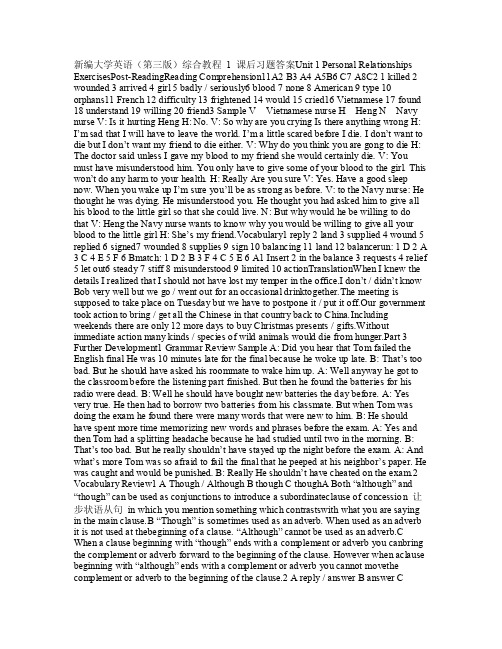
新编大学英语(第三版)综合教程1 课后习题答案Unit 1 Personal Relationships ExercisesPost-ReadingReading Comprehension11A2 B3 A4 A5B6 C7 A8C2 1 killed 2 wounded 3 arrived 4 girl 5 badly / seriously6 blood 7 none 8 American 9 type 10 orphans11 French 12 difficulty 13 frightened 14 would 15 cried16 Vietnamese 17 found 18 understand 19 willing 20 friend3 Sample V Vietnamese nurse H Heng N Navy nurse V: Is it hurting Heng H: No. V: So why are you crying Is there anything wrong H: I’m sad that I will have to leave the world. I’m a little scared before I die. I don’t want to die but I don’t want my friend to die either. V: Why do you think you are gong to die H: The doctor said unless I gave my blood to my friend she would certainly die. V: You must have misunderstood him. You only have to give some of your blood to the girl. This won’t do any harm to your health. H: Really Are you sure V: Yes. Have a good sleep now. When you wake up I’m sure you’ll be as strong as before. V: to the Navy nurse: He thought he was dying. He misunderstood you. He thought you had asked him to give all his blood to the little girl so that she could live. N: But why would he be willing to do that V: Heng the Navy nurse wants to know why you would be willing to give all yourbl ood to the little girl H: She’s my friend.Vocabulary1 reply 2 land 3 supplied 4 wound 5 replied 6 signed7 wounded 8 supplies 9 sign 10 balancing 11 land 12 balancerun: 1 D 2 A 3 C 4 E 5 F 6 Bmatch: 1 D 2 B 3 F 4 C 5 E 6 A1 Insert 2 in the balance 3 requests 4 relief 5 let out6 steady 7 stiff 8 misunderstood 9 limited 10 actionTranslationWhen I knew the details I realized that I should not have lost my temper in the office.I don’t / didn’t know Bob very well but we go / went out for an occasional drinktogether.The meeting is supposed to take place on Tuesday but we have to postpone it / put it off.Our government took action to bring / get all the Chinese in that country back to China.Including weekends there are only 12 more days to buy Christmas presents / gifts.Without immediate action many kinds / species of wild animals would die from hunger.Part 3 Further Development1 Grammar Review Sample A: Did you hear that Tom failed the English final He was 10 minutes late for the final because he woke up late. B: Th at’s too bad. But he should have asked his roommate to wake him up. A: Well anyway he got to the classroom before the listening part finished. But then he found the batteries for his radio were dead. B: Well he should have bought new batteries the day before. A: Yes very true. He then had to borrow two batteries from his classmate. But when Tom was doing the exam he found there were many words that were new to him. B: He should have spent more time memorizing new words and phrases before the exam. A: Yes and then Tom had a splitting headache because he had studied until two in the morning. B: That’s too bad. But he really shouldn’t have stayed up the night before the exam. A: And what’s more Tom was so afraid to fail the final that he peeped at his neighbor’s paper. He was caught and would be punished. B: Really He shouldn’t have cheated on the exam.2 Vocabulary Review1 A Though / Although B though C thoughA Both “although” and “though” can be used as conjunctions to introduce a subordinateclause of concessio n 让步状语从句in which you mention something which contrastswith what you are saying in the main clause.B “Though” is sometimes used as an adverb. When used as an adverb it is not used at thebeginning of a clause. “Although” cannot be used as an adverb.C When a clause beginning with “though” ends with a complement or adverb you canbring the complement or adverb forward to the beginning of the clause. However when aclause beginning with “although” ends with a complement or adverb you cannot movethe complement or adverb to the beginning of the clause.2 A reply / answer B answer Creplying Both “answer” and “reply” can be used as nouns and verbs. With a noun object we use the verb “answer” or “reply to”. e.g. We must answer / reply to these questions as soon as possible.3 A speaks B speak C talking D speak / talk You say that someone “speaks” or “can speak” a foreign language. If someone is giving a speech you say they are “speaking”. If two or more people are having a conversation you say that they are “talking”. You do not say that they are “speaking”. If you “speak to / talk to” someone you have a conversation with them.4 A injured / hurt B hurt / injured C wounded / injured D wounds You can be “wounded” or receive a “wound” from any attack in which a gun or sharp instrument such as a sword or knife is used. You can be “hurt” or “injured” or receive an “injury” a when any other weapon such as a heavy stick or bomb is used b in an accident. Both “wound” and “injure” are more serious than “hurt”. Note that “hurt” can be used as an intransitive verb but not “wound” or “injure”. e.g. It hurts when I try to move my leg.5 A houses B apartment apartments A “house” is a building for people to live in and often has more than one level. An “apartment” in American English or a “flat” in British English refers to a set of rooms within a larger building usually on one level.6A asideB apartC aside / apart Both “aside” and “apart” can be used as adverbs. “Aside” means “away or to the side”. “Apart” means “separated by a distance”. The phrase “aside from / apart from” means a except for b in addition to.7 A requests B requested C demandedD demands Both “request” and “demand” mean “ask for sth. or ask sb. to do sth.”. “Request” is more formal and stronger than “ask for”. “Demand” i s even stronger. If you “demand” something you feel strongly that you have the right to get it and will not take “no” for an answer. Both “request” and “demand” can be used as a verb or as a noun.A “request” for something is a polite demand for it.8 A bor derB boundary The word “border” refers to the dividing line between two countries or states or the land near that line. A “boundary” is a precise line marking the outer limits of an area.3 Roommates and Friends STEP ONE Sample In addition to those listed in the book my ideal roommate would also be: someone who does not smoke a responsible and honest person someone who does not snore while sleeping the best student in my class someone who does not stay up too late an independent person someone who does not interfere in my private affairs a tolerant person a trustworthy person etc. STEP TWO Sample No I don’t think roommates are usually friends. Living in the same room doesn’t necessarily mean that friendships will develop. Although roommates are usually friendly to each other not all of them are friends because friendliness is not always an indication of friendship. It’s true with classmates. Only when people have similar interests and a common outlook on life will they become friends or close friends. I think more often than not roommates will become friends. Obviously roommates spend much time together and therefore will learn a lot about each other. When people get to know each other friendship often develops. Many people could have become friends if they had met and got together often or long enough. Sharing rooms paves the way to friendship. We often hear older people say they were roommates or classmates and therefore good friends. It doesn’t mean roommates will surely become friends. They’re more likely t o become friends.4 It Made Me Feel So Good STEP TWO Sample As a newcomer in this university the first letter I’ve received here is from my best friend Dong Ming. Dong Ming and I were classmates in high school and we spent a lot of time together studying talking and playing around. I can safely say that not a single day was spent without our being together during our senior high school years. But now we’re studying at two different universities far apart from each other. Hisletter makes me feel as if we wer e together again talking. And what’s important is not the letter itself but what he said in the letter.Dear Dong HaoI felt sad when we left each other last Friday and yet a little happy about all the newthings and the excitement ahead of usin our new coll ege life. It’s what we want andneed.One thing is very important to both of us: to make more friends and to learn to get alongwith others. To do so I believe we should respect others—their point of view their wayof doing things etc. Only in this way can we make more friends and make our campuslife more interesting. What do you think I look forward to your reply. Best Wishes Dong Ming Sometimes I feel good about myself when I’ve been able to contribute a little bit to my relationships with others. I remember what I did for Xiao Li my next door neighbor and good friend. Last summer Xiao Li got seriously ill and was in the hospital for five weeks. At the beginning I didn’t know what I could do for him. I went to Mom for advice. Mom thought about it for a while a nd said “Well the only thing I can tell you is to be available when he needs you—not when you want to be available.” I took Mom’s advice seriously. I called him on the phone now and then to check if he needed any help and I went to see him every day after school and did what I could for him. So when Xiao Li recovered and left the hospital I felt so happy.5 When Your Neighbor Is in Need of Help STEP ONE Sample A young woman was walking along the streets one night when she was attacked. She screamed for help and managed to escape. A few minutes later her attacker caught her again and she continued screaming for help while the neighbors watched terrified from their windows and did nothing. They didn’t even call the police. The woman died of multiple stab wounds 多处刺伤. STEP TWO Sample 1 I think there are several reasons for that. First people were rather cowardly and selfish. When they heard someone screaming late at night they thought that might be dangerous so they just stood back and watched the woman get killed in front of them. They preferred to protect themselves rather than get involved to risk being injured or even killed. Second they felt that there are already institutions in cities to deal with this kind of problem. They didn’t think they needed to intervene because the police would do something for them. Finally it is possible that these people were so terrified that they could not think clearly or take action to protect the woman. 2 I don’t know. Maybe I would go to the street and try to protect the woman. I think more people would come to help if they realized what was really happening. Maybe I would call the police. But I’m afraid that when the police arrived she might already have been killed. Or maybe I would be too scared to give any help. I might simply close the window and put my ear plugs in. These are the different things I might do on such an occasion but I believe it’s most likely that I would call the police.Part 4 Translation and Writing2 Translation Practice Lean on Me 依靠我吧Sometimes in our lives we all have pain we all have sorrow 生活中我们会有痛苦,会有悲伤But if we are wise we know that there’s always tomorrow. 然而,聪明的我们明白总有明天(可指望)。
综合英语教程(第三版)BOOK1-课文译文11.第十一单元
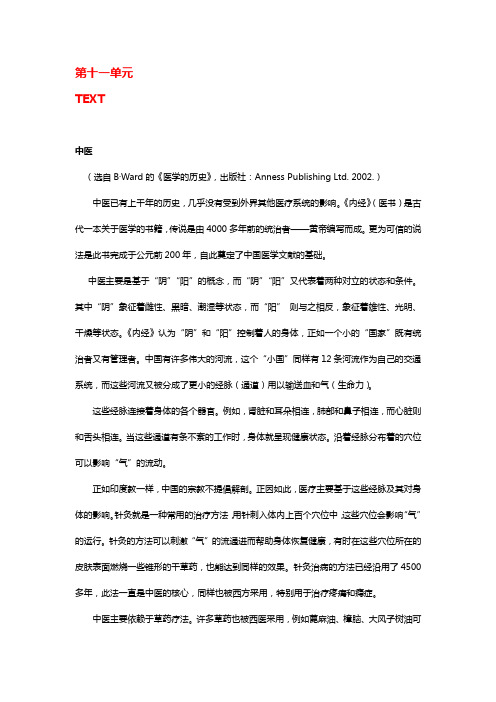
第十一单元TEXT中医(选自B·Ward的《医学的历史》,出版社:Anness Publishing Ltd. 2002.)中医已有上千年的历史,几乎没有受到外界其他医疗系统的影响。
《内经》(医书)是古代一本关于医学的书籍,传说是由4000多年前的统治者——黄帝编写而成。
更为可信的说法是此书完成于公元前200年,自此奠定了中国医学文献的基础。
中医主要是基于“阴”“阳”的概念,而“阴”“阳”又代表着两种对立的状态和条件。
其中“阴”象征着雌性、黑暗、潮湿等状态,而“阳”则与之相反,象征着雄性、光明、干燥等状态。
《内经》认为“阴”和“阳”控制着人的身体,正如一个小的“国家”既有统治者又有管理者。
中国有许多伟大的河流,这个“小国”同样有12条河流作为自己的交通系统,而这些河流又被分成了更小的经脉(通道)用以输送血和气(生命力)。
这些经脉连接着身体的各个器官。
例如,肾脏和耳朵相连,肺部和鼻子相连,而心脏则和舌头相连。
当这些通道有条不紊的工作时,身体就呈现健康状态。
沿着经脉分布着的穴位可以影响“气”的流动。
正如印度教一样,中国的宗教不提倡解剖。
正因如此,医疗主要基于这些经脉及其对身体的影响。
针灸就是一种常用的治疗方法,用针刺入体内上百个穴位中,这些穴位会影响“气”的运行。
针灸的方法可以刺激“气”的流通进而帮助身体恢复健康,有时在这些穴位所在的皮肤表面燃烧一些锥形的干草药,也能达到同样的效果。
针灸治病的方法已经沿用了4500多年,此法一直是中医的核心,同样也被西方采用,特别用于治疗疼痛和瘾症。
中医主要依赖于草药疗法。
许多草药也被西医采用,例如蓖麻油、樟脑、大风子树油可以用来治疗麻风病,铁可以治疗贫血。
众所周知,人参是中国的兴奋剂,用后可使人精力旺盛。
古代的中国人还发明了接种疫苗的方法用以治疗天花。
他们从天花中提取的少量脓汁注射到健康的人体内,使之产生轻微的疾病症状进而对深度感染形成免疫力。
欧洲直到公元1700年才发现了接种疫苗的方法。
新编实用英语第三版综合教程Unit_1_Hello__Hi(session4)

Example: Let's steer our ship with hope, leaving fear behind.
精品PPT
Back
Read and Think
Read and Complete Read and Translate Read and Simulate
PASSAGE II
Information Related to the Reading Passage
Text Language Points
Read and Judge Read and Translate
be time for an update: info update and photo update ...
✧ Perhaps set a goal of handing out 5 cards a day. ✧ Practice what you will say when handing them out. On a daily basis, there
6. Say hello in different languages
7. Write a business card
What You Should Know About 1. Etiquette of meeting and introducing people
2. Etiquette of exchanging business cards
千万别在开始新的交往时就让人觉得这家伙就没打算同我交往
Unit | One
Hello, Hi!
精品PPT
Unit |Байду номын сангаасOne
Unit Goals:
综合英语教程(第三版)BOOK1-课文译文06.第六单元
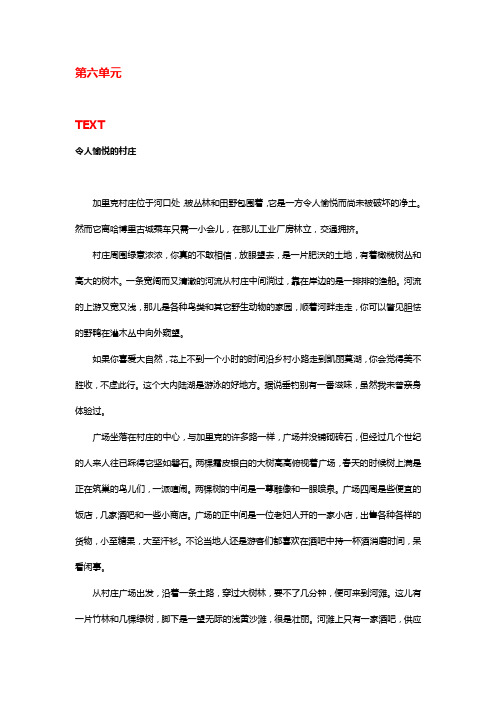
第六单元TEXT令人愉悦的村庄加里克村庄位于河口处,被丛林和田野包围着,它是一方令人愉悦而尚未被破坏的净土。
然而它离哈博里古城乘车只需一小会儿,在那儿工业厂房林立,交通拥挤。
村庄周围绿意浓浓,你真的不敢相信,放眼望去,是一片肥沃的土地,有着橄榄树丛和高大的树木。
一条宽阔而又清澈的河流从村庄中间淌过,靠在岸边的是一排排的渔船。
河流的上游又宽又浅,那儿是各种鸟类和其它野生动物的家园,顺着河畔走走,你可以瞥见胆怯的野鸭在灌木丛中向外窥望。
如果你喜爱大自然,花上不到一个小时的时间沿乡村小路走到凯丽莫湖,你会觉得美不胜收,不虚此行。
这个大内陆湖是游泳的好地方。
据说垂钓别有一番滋味,虽然我未曾亲身体验过。
广场坐落在村庄的中心,与加里克的许多路一样,广场并没铺砌砖石,但经过几个世纪的人来人往已踩得它坚如磐石。
两棵霜皮银白的大树高高俯视着广场,春天的时候树上满是正在筑巢的鸟儿们,一派喧闹。
两棵树的中间是一尊雕像和一眼喷泉。
广场四周是些便宜的饭店,几家酒吧和一些小商店。
广场的正中间是一位老妇人开的一家小店,出售各种各样的货物,小至糖果,大至汗衫。
不论当地人还是游客们都喜欢在酒吧中持一杯酒消磨时间,呆看闲事。
从村庄广场出发,沿着一条土路,穿过大树林,要不了几分钟,便可来到河滩。
这儿有一片竹林和几棵绿树,脚下是一望无际的浅黄沙滩,很是壮丽。
河滩上只有一家酒吧,供应简单的午饭和饮料。
当地人大多是农民或渔民,虽然许多人在自己的地产上建起了越来越多的房屋,在夏季时出租给游客供一宵住宿,一顿早餐。
然而,到目前为止,村庄里还没有大的宾馆,这样也就避免了大规模旅游业带来的影响,村庄也就保留下了它独有的魅力和特色。
如果你想寻找一处安静、详和而又优美的田园风光,加里克是个好去处——趁着大家还不知道它!(高全孝译,张校勤校)READ MORE迷人的村庄欢迎你如果你想看一座真正美丽又尚未被人为破坏的小村庄,你绝对不该错过哈特福特的。
一进入这个村庄,首先看到的是一个池塘,池塘旁边是古老的圣玛丽教堂。
大学体验英语综合教程1(第三版)-课文unit3
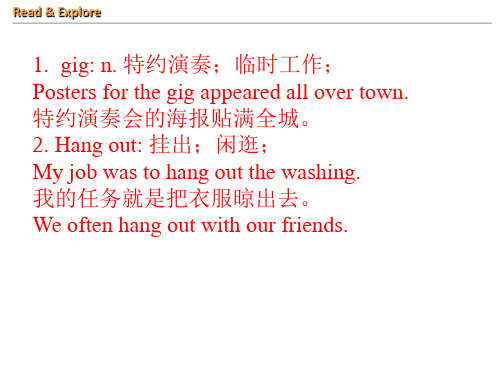
Unit 3
Return to Menu
Passage A
Passage B
Passage A
• Think About It
• Read About It
• Talk About It
• Write About It
1. What do you usually do in your leisure time on campus?
members of several societies and
taking part in whichever of their events seem interesting. Many people,
perhaps foolishly, completely ignore
university societies and just hang out with mates in college.
Read & Explore
4. Eat me out of house and home:把某人吃穷 He's been eating me out of house and home. 他吃得我倾家荡产. 5. coke: n. <口>可口可乐(=Coca-Cola) 6. hit it off 合得来 7. But he wasn't obnoxious and I liked the volunteer work he did. We hit it off. 他并不讨人厌,而且我也喜欢他的志愿性工作,这 大概是我们合得来的原因。
Reference:
As far as I’m concerned, I like listening to music and doing some reading in my spare time. Weather permitting, I enjoy some outdoor activities, such as mountain climbing, bicycle-riding, and so on.
大学体验英语综合教程1(第三版)-unit1课件详细版

写一篇关于大学生活感悟的短文,要求表达真实情 感和经历。
写作训练二
写一篇关于学术研究的报告,要求结构清晰、论点 明确。
写作训练三
写一篇关于未来职业规划的规划书,要求目标明确、 计划可行。
04
learning strategy
Suggested learning methods
Active learning
听一段关于学术研究的讲座,总结讲座要点。
reading comprehension
阅读理解一
阅读一篇关于大学生活适应的文章,完成选择题和简答题。
阅读理解二
阅读一篇关于学术论文写作的文章,分析文章结构和论点。
阅读理解三
阅读一篇关于职业规划的文章,总结文章要点并提出个人见解。
Writing training
03
Fill-in-the-blank questions: Assess vocabulary and grammar skills.
Test content and format
Short answer or essay questions
Evaluate critical thinking and writing skills.
Test content and format
01
Speaking ability
Evaluate fluency, pronunciation, and communication skills.
02
Reading ability
03
Writing ability
Measure comprehension and analysis of different types of texts.
综合英语教程第一册第三版Unit 8 The Message behind the Smile

Unit 8The Message Behind the SmileTeaching Objectives:1. Functions: Making requests2. Grammatical Points: modal verbs such as can/may/will/shall for expression of obligation3. V ocabulary: likely/unlikely, find, expect, involve, end up, concentrate on, fail to do, involve, come to, shapeI.Teaching AidMulti-mediaII.Teaching Arrangement8 class hoursIII.Teaching Procedure1.In this part, we are going to learn how to make requests.When you make a request, you ask someone for something or ask him to do something. When you tell someone to do something rather than ask him to do something, you give them an order or an instruction. Usually, a request may seem more polite than an order or instruction. Note that for all the politeness, a request can be made in various ways which show different degrees of politeness.The simplest way to ask for something is to say "Can I have ... ?" and to sound more polite, you may use "Could I ... ?"e.g. Can I have some tomatoes?Could I have another cup of tea?Note that people used to be taught that to make more polite requests, one should use "may" instead of "can", "might" instead of "could". However "can" and "could" are now generally used. Requests with "may" could be too formal and those with "might" sound old-fashioned.To ask for something in an informal, indirect way, you can use "Have you got...?" or "You haven't got..., have you?"For a customer to ask for something in a bar, shop, restaurant, café, or hotel, requests can be made like this:e.g. One salad, one glass of red wine, please.I'd like a single room, please.You can ask someone to do something by saying "Can you ... ?" or "Will you ... ?" in informal situations. To make it more polite, you can use "Could you ... , please?" or "Would you..., please?"In formal letters and speeches, you use very polite expressions to make requests:e.g. I would be grateful if you let me know.You can use expressions such as "Would you do me a favor?" and "I wonder if you could do me a favor" to indicate that you are about to make a request.Possible ways to make requests:Could you possibly pass me the salt?Would you be so kind as to give me a call?Would you mind opening the window?Do you think you could post the letter for me?I wonder if you could go shopping with me?You haven't got a torch手电筒, have you?I'll have a glass of beer.Have you got a book called Evolution?Can /Will you turn on the light?Could/Would you turn on the heater, please?I would appreciate it if you could make an early reply.Would you kindly send me a brochure of your school?Bill, would you do me a favor?Could you lend your textbook to me for just one day?Ways to reply to a request:Yes, Ok.All right.Sure.Certainly.I'm afraid I can't.Sorry, I can't.Go ahead, please.2.Conversation one1)Have students practice the conversation, and highlight the sentences for making polite requests.May I speak to Judy? (A telephone formula)Make I take a message? (A request for permission)Please ask her to…(A request for Judy’s sister)Could you possibly ask her…These requests suggest Susan was very polite, so we may infer that she wasn’t very familiar to Judy’s sister.2)Words and phrases1.Residence[ˈrezidəns]: n. a person's house, especially a large and impressive one寓所,住宅,大宅in residence: living in or occupying a particular place 居住于(某一场所);占用(某一场所)take up residence : start living in a particular place. 开始定居于…permanent residence永久住处change one's residence改变住所2.tennis[ˈtenis]: a game in which two or four players strike a ball with rackets over a net stretched across a court. Theusual form (originally called lawn tennis) is played with a felt-covered hollow rubber ball on a grass, clay, or artificial surface网球运动tennis arm [elbow] 网球员肘病tennis shoes网球鞋, 跑鞋a tennis court网球场table tennis乒乓球运动3.cousin[ˈkʌzn]: a child of one's uncle or aunt堂兄弟;堂姐妹;表兄弟;表姐妹cousin-in-law表姐[妹]夫,表嫂,表弟媳,堂姐[妹]夫,堂嫂,堂弟媳4.racquet=racket[ˈrækit]: n. a bat with a round or oval frame strung with catgut, nylon, etc., used especially in tennis,badminton, and squash(尤指网球、羽毛球和软式墙网球的)球拍5.extra[ˈekstrə]: adj. added to an existing or usual amount or number额外的,分外的,外加的extra loss额外损失extra bus加(班)车extra allowance特别津贴extra hand临时雇工extra train加(班火)车We do not ask for extra pay. 我们不要求额外报酬。
(完整)大学体验英语综合教程1 第三版 Unit 4 电子教案
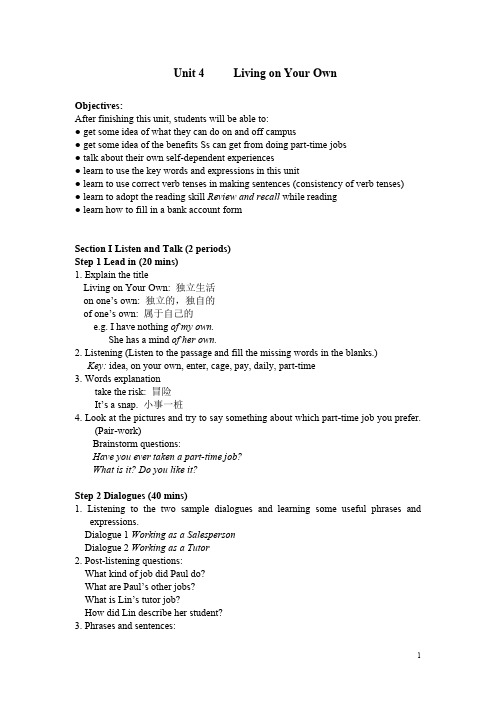
Unit 4 Living on Your OwnObjectives:After finishing this unit, students will be able to:● get some idea of what they can do on and off campus● get some idea of the benefits Ss can get from doing part-time jobs● talk about their own self-dependent experiences● learn to use the key words and expressions in this unit● learn to use correct verb tenses in making sentences (consistency of verb tenses)● learn to adopt the reading skill Review and recall while reading● learn how to fill in a bank account formSection I Listen and Talk (2 periods)Step 1 Lead in (20 mins)1. Explain the titleLiving on Your Own: 独立生活on one’s own: 独立的,独自的of one’s own: 属于自己的e.g. I have nothing of my own.She has a mind of her own.2. Listening (Listen to the passage and fill the missing words in the blanks.)Key: idea, on your own, enter, cage, pay, daily, part-time3. Words explanationtake the risk: 冒险It’s a snap. 小事一桩4. Look at the pictures and try to say something about which part-time job you prefer.(Pair-work)Brainstorm questions:Have you ever taken a part-time job?What is it? Do you like it?Step 2 Dialogues (40 mins)1. Listening to the two sample dialogues and learning some useful phrases andexpressions.Dialogue 1 Working as a SalespersonDialogue 2 Working as a Tutor2. Post-listening questions:What kind of job did Paul do?What are Paul’s other jobs?What is Lin’s tutor job?How did Lin describe her student?3. Phrases and sentences:work part-time: 兼职工作minimum: 最小值maximum:最大值head (for): go toeager to learn: 好学Step 3 Communicative Tasks (30 mins)Work in pairs and act the dialogue to the whole class.Topic: Interviewing for a part-time jobUseful sentences:Can you briefly describe yourself?Why do you want this job?What are your career goals?What are your main strengths and weaknesses?Why should I hire you instead of many other candidates?Do you have any questions about the job?I worked hard and I won some awards.I think it will help me in my major, but I’d rather only work evenings and weekends. Step 4 Assignments1. Read the dialogues and practice communicative tasks2. Preview new words and expression in Passage ASection II Read and Explore (4 periods)Passage A Marcela’s Work ExperienceStep 1 Pre-reading Tasks (15 mins)1.Greetings and a brief revisionAsk one or two pairs (groups) to act out their own dialogues2.Lead-in questions:1) Do you have any working experience? What kind of work do you think you would enjoy?2) Where did the author go? What did the author do and how did she enjoy her work experience there?3) What main lessons did the author learn from her time abroad?2. Culture Notes:1)BUNAC (British Universities North American Club): This is a program from the USA. BUNACcurrently offers US students and young people work/travel programs to Britain, Australia, New Zealand, etc. Each participating country offers a unique insight into life in a completely new culture and a chance to spend extended time working and traveling overseas. US students can work anywhere in Britain for up to six month at any time during the year and explore the whole of the UK while they are there.2)Bank Holiday: A holiday of national importance such as Christmas or New Year's Day whenbanks and some other businesses are closed (altogether there are 8-10 of these per year inthe UK)3)Merrill Lynch International Bank: A very large international company which specializes in avariety of financial services such as stocks, bonds, mutual funds, credit cards, and checking accounts. It has offices in 38 countries.Step 2 While-reading Tasks (75 mins)1.Read the text as quickly as possible and try to answer the following questions:1) When did Marcela decide to experience living abroad and when did she actually go to live abroad?2)How did Marcela’s motives and actions differ from those of her classmates?3) Why did Marcela say that it was pretty scary when she arrived in London?4) When did Marcela have her first interview and how many did she have altogether?5) How highly did Marcela think of her experience working in London?2. Language Points:1) experience:v. suffer, feel, or knowe.g. He experienced great difficulty in getting a visa to the leave the country.The child had never experienced kindness.n. knowledge or skill which comes from practice rather than from bookse.g. You have the chance to gain valuable work experience.I know from my own experience how difficult this kind of work can be.2) open: not completely decidede.g. Try to keep an open mind on the subject until you have heard all the fact.The race is still wide open (= anyone could win).3) undertake: to take up or accept (a duty or piece of work, esp. one that is difficultor needs effort)e.g. undertake a mission, task, project, etc.She undertook the responsibility for the changes.She undertook the organization of the whole scheme.4) learn about: get to know about, become informed ofe.g. I like reading historical stories because I learn about the lives that peopleled long ago.How did you learn about our product?5) It is / was not … until: an emphatic patterne.g. It wasn’t until 10 o’clock that he came back to his dorm.(At 10 o’clock he finally came back.)6) orientation: an introduction, as a tour, that helps one to adjust to new surroundingsor introductory instruction concerning a new situatione.g. The university required that all new students arrive early for a thirty-minuteorientation to the library facilities.In many companies the orientation of new employees is the duty of thetraining office.7) … my financial resources were running low: I had not much money left.e.g. I was tired and my energy was running low.The gasoline in the car’s tank was running low.8) It turns out that: in the end, it happens to be …e.g. It turned out that the person seated next to me on the train was one of myold friends.It turned out that my new job was much easier than I expected.9) participate in: be involved ine.g. It’s good for students to participate in a variety of activities.Some students are too shy to participate in the discussion.10) choose from: to pick out or select from a number of alternativese.g. Students have many different majors to choose from.Drivers have many different brands of cars to choose from.11) adjust to: to make necessary changes in order to make right or make suitable fora particular purpose or situatione.g. Some people from small towns have trouble adjusting to the fast pace ofurban life.After the kids become grown-ups the parents must adjust to having fewerpeople in the house.12) cover: to include; deal with; travele.g. Our trip covered only half of what the tour guide intended.The survey covers all aspects of the business.13) get to learn / know: become familiar withe.g. After you get to know him, you will find that he’s really quite nice.You will get to know and like the city more after you’ve lived here for a while.14) …while most of my friends were interviewing for “real world” jobs.… while they were looking for jobs and having interviews.15) I was pretty open about where to go and what kind of work to undertake.I didn’t have a specific idea as to where to go and what kind of work to take whilefacing several options.16) … there are many employers in many different fields to choose from.… there are many different types of jobs are available.17) I probably covered only half of what I intended.I probably visited only half of the places I wanted to travel.18) I would not hesitate for a second to recommend it to anyone.I’d readily and enthusiastically recommend it to anyone.3.Words and expressionsabroad adv. to or in another country or countries 到国外,在国外accommodation n. a place to live or work, house, flat, hotel room etc. 住处,住所advantage n. sth. that may help one to be successful or to gain a favorable result有利条件,优势 a favorable condition resulting from a particular course of action, gain, 好处,长处,优点aspect n a particular side of a many-sided situation, idea, plan, etc. (事态,想法,计划等的某个)方面economical adj. using money, time, goods, etc. carefully and without any waste 经济的,节俭的,精打细算的employment n. the state of being employed 雇用,就业paid work 职业,工作expense n. cost esp. of money but also time or effort (时间,精力,金钱等的), 消耗,消费fax v. to send (copies of printed material, letters, pictures, etc.) using a system by which the information is sent in electronic form along a telephone line 传真传输(印刷品,信件,图片等)hesitate v. to pause before taking an action or making a decision 踌躇,迟疑,犹豫(不决)inquiry v. ( an act of ) asking for information 询问,打听insurance n. agreement by contract to pay money to someone if something esp. a misfortune such as illness, death, or an accident happens to them 保险intend v. to have in one’s mind as a plan or purpose; mean (to do)计划,打算,想要internationalize v. to make (sth.) international or bring under international control 使国际化investigate v. to try to find out more information about, examine the reason for(sth.), the character of (someone) 调查,侦查opportunity n. a favorable moment or occasion (for doing sth.) 机会,时机★orientation n. a position or direction 方向,方位;an introduction, as a tour, that helps one to adjust to new surroundings, introductory instructionconcerning a new situation熟悉适应的过程, 适应(新环境的)培训▲paycheck n. a check for the amount of wages a person earns工资precisely adv. exactly 精确地,准确地,正好recommend v. to praise as being good for a purpose; to provide information about (someone or sth. good) 推荐,介绍rent n. money paid regularly for the use of a room, building, television set, piece of land, etc. (租用房屋,电视机,土地等的)租金resource n. any of the possessions or qualities of a person, an organization, or esp.a country 物力,财力,资源résumén. summary 简历,摘要scare v. to cause sudden fear to, frighten 恐吓,使惊恐tax n. money which must be paid to the government according to income, property, goods bought, etc.税,税款truly adv. exactly, in accordance with the truth 确实地,准确地,really 真正地undertake v. (undertook, undertaken) to take up or accept (a duty or piece of work, esp. one that is difficult or needs effort) .承担,接受visa n. 签证workforce n. the people who work in a factory or in industry generally, considered as a group 劳动力,全体从业人员Phrases and Expressionsas a resultconsequently 结果run low to have not much left (of sth.)减少, 所剩无几so far up to now 迄今为止turn out to happen to be 结果(是)Proper NamesMerrill Lynch 美林(证券)the Atlantic the Atlantic Ocean 大西洋Buckingham Palace the official residence of the British monarchs and some of their family白金汉宫Step 3 Post-reading Tasks1.Summarize the passageSummary:The student in the article decided to find a temporary job in another country before starting her career in her home country. So she entered a well-known program to place students in such jobs. After arriving in London, England she had to find a place to live and prepare to find a job. The program helps her but she had to do most of it on her own. After three interviews she accepted a job in an international bank and exposed her to a foreign culture, it also helped her develop the confidence to make other good decisions in the future.2.Check the answers of Ex.4, 5 and 6Step 4 Assignments1.Oral Practice--- Talk about it2.General writing--- I Got the JobPassage B Living on My Own (4 periods)Step 1 Pre-reading Tasks (15 Mins)1.Greetings and a brief revisionAsk students to present their dialogues according to “Talk About It”2.Lead-in questions:1) When do you think you can live on your own?1)What does the author think about living on his own?3.Culture Notes:For Chinese students this may mean leaving home to attend college. Elsewhere, however, this may not provide enough independence to satisfy student desires for freedom from parents or other types of control. After all, colleges and dormitories have many rules and restrictions, such aslimitations on when and where one can study. Noise and lack of privacy are additional complaints of dormitory residents everywhere. American students, in particular, are often eager to move off campus as soon as they can. This may occur as early as the sophomore year at most American colleges.Step 2 While-reading Tasks (75 mins)1. Read the passage as quickly as possible and try to answer the following questions:1)Why did the author decide to leave home according to the passage?2)How did the author feel after he lived on his own?3)What can be included from the passage about the author?4)What did the author think was the nicest thing in the world?5)What does the passage mainly tell us?2. Language points:1) decide vi. & vt.: to make choice or judgment about sth., esp. after a period of notknowing what to do or in a way that ends disagreement decide to do sth. / decide sth.e.g. Women now have greater freedom to decide whether or not to getmarried.decide in favor of / decide againste.g. After long discussion they decided in favor of the young candidate.It is always possible that the judge may decide against you.decide on sth.: to choose one thing from many possible choicese.g. We are still trying to decide on a venue.2) to have trouble (in) doing sth.: to have difficultye g. Did you have much trouble dealing with the problem?Do you have any trouble in finishing the task in time?3) think about: be aware of sth. when you consider a fact or subjecte.g. He thought about taking up a part-time job during the summer vacation.This chapter is important, so you should think about it as you readfurther.4) decisive: showing determination and firmness, resolutee.g. a decisive leader / a decisive actionShe demonstrated a talent for quick, decisive action.a decisive step / role / battle, etc.: an action, event that has a powerful effect onthe final result of sth.e.g. Waterloo was the decisive battle of the entire war.He played a decisive role in the recent peace process.5) creative: having the ability to produce new and original ideas, results, etc.e.g. He came up with a really creative solution to the problem.very imaginative and good at making things, painting, etc.e.g. You’re creative to make so fashionable clothes on your own.6) assign: to give someone a particular job or make them responsible for aparticular person or thinge.g. Jane’s been assigned to the Asian Affairs Bureau.The teacher has assigned each of the students a holiday task.7) keep up with: rise at the same rate; inform oneself or learn aboute.g. He studied very hard so that he could keep up with his classmates.I can’t keep up with all the changes in computer technology.8) fail to do: be unsuccessful in sth.e.g. The report fails to mention the real cost of this experiment.9) now that: sincee.g. Now that you are a college student, you’d better live on your own.Now that you have finished the final examination, you may relax and take a break.10) to make one’s own decision: to decide by oneselfe.g. I haven’t made my decision on that matter yet.They said they would not make their final decision until the electionresult came out.11) I have made rules for myself to follow:e.g. The coach made rules for the team to follow.I made a rule never to prohibit anything without a good reason.12) in conclusion: used in a piece of writing or a speech to show that you are aboutto finish what you are sayinge.g. In conclusion, I should like to thank all those who have worked so hardto bring about this result.conclusion: the end; a judgment or decisione.g. I found the conclusion of his book very interesting.13) in addition: used when adding another fact to what has already been mentionede.g. Aunt Mary gave us sandwiches for our picnic and a bag of cookies inaddition.14) appropriate: correct or suitablee.g. At an appropriate moment I’ll offer the visitors some coffee.Your clothes are hardly appropriate for a job interview.15) at the same time: in the same momente.g. The two runners reached the finish line at the same time.in spite of the fact; even thoughe.g. John did pass the test, at the same time, he did not know the subject verywell.16) make use of: use or benefit from sth. or sb.e.g. Almost every student today can make use of a computer.The teacher told them that they had to make good use of their time.17) lead to: to cause; to have as a resulte.g. To be blind to this will lead to the gravest error.What do you think lead to his doom?18)In addition, I think that it is appropriate for everyone in this world to lovetheir parents and themselves before they love anyone else.Besides, I feel it is correct for everyone in this world to love their parents and themselves first and then love everyone else.19) I wrote a lot of songs and kept them in my notebook for any singer outthere who might be interested.I wrote a lot of songs and kept them in a notebook for any other singer anywherewho might be interested.20) When I was with my parents I found it hard for me to be creative simplybecause I always followed their ideas.When I was living with my parents I found I was not creative because I wasalways ready to do what they told me to do.3.Words and expressionsaddition n. the act of adding or combining sth. to or with sth. else 增加appropriate adj. correct or suitable for a particular time, situation, or purpose适当的;合适的;正当的assign v. to give sb. a particular job or make them responsible for aparticular person or thing 指定(某人做一工作或任某职务);委派,选派;todecide that something should be done at or during a particular time 指定,确定(时间, 地点)authority n. the power one has because of one’s official position orbecause people respect one’s knowledge and experience 权利,权威;theauthorities are the people or organizations that are in charge of a particular country orarea 领导,当局,官方★ carve v. to cut a large piece of cooked meat into smaller pieces using a bigknife 把(熟肉)切成片;to cut shapes out of solid wood or stone 雕刻conclusion n. the end, a judgement or decision 结束;结尾creative adj. producing or using new and effective ideas, results etc. 创造的;有创造性的someone who is creative is very imaginative and good at making things, painting etc.有创造力的★decisive adj. showing determination and firmness, resolute果断的坚定的, 有决断力的homesick adj. feeling a great wish to be at home when one is away from it 想家的notebook n. a book made of plain paper on which you can write notes 笔记本outcome n.the final result of a meeting, discussion, war etc, especiallywhen no one knows what it will be until it actually happens 结果;效果Phrases and Expressionsat the same time (as) in the same moment; together; however, but; nevertheless 同时;一起;但是;然而deal with to attend to (a problem, task, etc); to manage 处理(问题、任务)fail to to be unsuccessful in (sth.) 未能(做某事)first of all most importantly 首先get along with to have a harmonious or friendly relationship with sb.; to get on with 和睦相处in addition (to) as an extra person, thing or circumstance 加之;除…之外in conclusion lastly 最后keep up with to rise at the same rate (as sth.); to inform oneself or learn about (the current events) 赶上;追上make use of to use or benefit from sth. or sb. 使用;利用now that since, because, now 由于…;既然…Step 3 Post-reading Tasks (90 mins)1. Summarize the passageSummary: Leaving home for the first time, either to go to college or for some other reason, can be difficult. With no parents nearby, there are many new decisions to make on our own. Decisiveness and creativity are both needed to make these decisions wisely. Plans and rules may be needed. But every day different situations may arise. It’s impossible to have a plan or a rule for every situation. That’s why creativity is also needed. Being away from home may teach some young people to appreciate their parents even more.2. Check the answers of Ex. 12, 13 and 14Section III Write and Produce (2 periods)Step 1 Revision (10mins)Dictation of words and phrases in Passage A and BStep 2 Grammar (35 mins)Consistency of Verb TensesWe use the verb tense to indicate the particular time of an action, event or condition. When we want to describe a number of actions or events, we will use different tenses in a sentence, a paragraph and a whole composition. Necessary changes in verb tense help readers understand the relationships among various events.But if we make unnecessary or inconsistent shifts in tenses, it will cause misunderstanding. Generally, we keep one tense as the main tense and indicate changes of time by changing tenses relative to that primary tense.Step 3 Practical Writing ( 45 mins)Bank Account FormThere are several kinds of accounts available, such as regular savings accounts, certificates of deposit, joint accounts, and trust accounts.Step 4 AssignmentsSuppose you want to open a 6-month individual certificate of deposit by yourself (not jointly or in trust for someone else). (When you sign the form) you promise now to withdraw the money for at least 6 months or you will have to pay a penalty. Try to fill out the form.11。
综合英语教程1第三版

综合英语教程1第三版综合英语教程1,第三版是一本广泛使用于大学英语教学的教材。
该教材的主要目标是帮助学生全面提高英语语言能力,涵盖了听、说、读、写和翻译等多个方面的训练。
第一部分是听力训练。
该部分通过一系列听力材料和相关练习,帮助学生提高听力技巧和理解能力。
材料包括对话、短文、讲座等,内容涵盖了各个领域,让学生接触到真实的语言环境。
练习包括听后选择、填空、听写等,旨在提高学生对听力材料的理解和应用能力。
第二部分是口语训练。
该部分通过模仿、对话、角色扮演等活动,帮助学生提高口语表达能力。
教材中的口语练习题目设计有趣,涵盖了日常生活、学习和工作等多个场景,能够培养学生的口语流利度和语言交际能力。
第三部分是阅读训练。
该部分通过一系列精选的英语文章和阅读理解题,帮助学生提高阅读理解和分析能力。
文章的主题丰富多样,涵盖了社会、文化、科技等各个领域,通过阅读不同的文章,学生能够扩展词汇量,提高阅读速度和理解力。
第四部分是写作训练。
该部分通过写作任务、写作指导和范文展示,帮助学生提高写作能力。
教材中包含了各种写作题目,如描述图表、写信、写作文等,通过规范的写作练习,学生能够学会正确表达自己的观点和想法,提高写作逻辑性和语言表达能力。
第五部分是翻译训练。
该部分通过翻译任务和相关练习,帮助学生提高翻译技巧和能力。
教材中的翻译内容涵盖了句子、段落和文章等,旨在培养学生的跨文化交际能力和语言转换能力。
综合英语教程1,第三版的特点是内容全面,涵盖了各个方面的英语训练,从而全面提高学生的语言能力。
教材中采用了多种教学方法和教学资源,如录音材料、练习题和范文等,使学生能够多样化地学习和练习英语。
此外,教材还注重培养学生的语言应用能力和跨文化交际能力,提供了丰富的实例和案例,让学生真正感受到英语在现实生活中的应用和价值。
总之,综合英语教程1,第三版是一本全面、实用的英语教材,适用于各个层次的学生。
通过学习该教材,学生能够全面提高英语语言能力,更好地应对现实生活和学术研究中的英语应用。
新编实用英语第三版综合教程Unit 1 Hello, Hi!(session2)
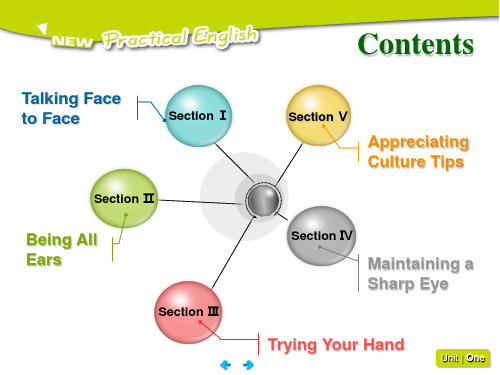
1) Hello, nice to meet you. Mrs. Waters. 1) 您好,见到您很高兴,沃特斯夫人。
10) My name is Richard Washington.10) 我叫理查德· 华盛顿,就叫我理查德好了。
Please call me Richard. Window on Key Words excuse 请原谅,劳驾 president 校长 college 学院 Canada 加拿大 surprise 惊喜
7) Hi , long time no see. Do you remember me?
6) 欢迎来到我们学我吧?
8) What a surprise to see you here. 8) 在这里见到你真是个惊喜。 9) Oh, it's you, President Kong. Nice 9) 噢,是你呀,孔校长。很高兴再次见到您。 to see you again.
2) Excuse me, are you Mr. Green from England? my card. 4) Glad to meet you, Paul. Here is my card. 5) How are you, Jack? Nice to see you again. 5) 杰克,你好吗?再次见到你真高兴。
Unit | One
Understanding a Short Speech / Talk
Listen and Complete 5 Now listen to a short speech / talk and fill up the blanks according to what you have heard. The words in brackets will give you some hints. Professor Good morning, everyone. It's my honor to introduce 1 (whom?) ___________ Waters _____________ to you. Professor Waters is from 2 (which country?)
综合英语教程1第三版课后练习题含答案

综合英语教程1第三版课后练习题含答案第1课课后练习题答案选择题1.C2.B3.B4.B5.C6.C7.B8.B9.A10. C填空题1.science2.globe3.world4.geography5.techniques6.ancient7.precise8.observatory9.universe10.symbolizes翻译题1.他在仪器上花费了整整一个下午。
2.星座对于那些长期在海上航行的人来说非常重要。
3.我们需要更多的资金去支持我们的科学研究项目。
4.古希腊人发明了许多科学技术,这些技术至今仍然被使用。
5.上帝为我们创造了宇宙。
第2课课后练习题答案选择题1.C2.A3.A4.B5.A6.B7.C8.C9.B10. A填空题1.possess2.conduct3.principal4.individual5.capability6.legislation7.manifest8.supreme9.execute10.integrity翻译题1.他们决定成立一个新的公司来生产这种新的产品。
2.遵守道德准则可以帮助我们成为更好的人。
3.我们的目标是把自己的公司建设成为一个受人尊敬的组织。
4.风险投资者通常会要求获得公司的股份。
5.领导者应该有良好的判断力和才能。
第3课课后练习题答案选择题1.B2.C3.A4.B5.A6.C7.B8.A9.C10. B填空题1.existence2.diverse3.rapid4.transformation5.influences6.adapted7.encountered8.conflicting9.stable10.interact翻译题1.这家公司已经度过了很多次危机,它拥有适应变化的能力。
2.科技的发展速度非常快,我们需要不断地更新我们的知识。
3.冲突和不同文化之间的碰撞是不可避免的。
4.一个人的成长和生存需要时刻适应环境的变化。
5.人们可以通过分享知识和经验来加强彼此之间的交流。
大学体验英语综合教程1(第三版)课后翻译答案

一1. 你愿意把你的经验和组里的其他人分享吗?(share sth with sb)Answer: Would you like to share your experience with the rest of the group?2. 你父亲如果还健在的话,他会为你骄傲的。
(be proud of)Answer: If your father were still alive, he would be very proud of you.3. 她开车转弯上了自家的车道(driveway),不料发现路已被堵塞(block)。
(only to)Answer: She turned up the driveway, only to fi nd her way blocked.4. 他没有告诉任何人就走了,因为他不想卷入那件事。
(get involved in)Answer: He went away without telling anyone, because he didn’t want to get involved in that matter.5. 最终,产品的成功还是取决于高明的销售手段(marketing)。
(ultimately)Answer: Ultimately, the success of the product depends on good marketing.1我发觉自己对英语口语有着浓厚的兴趣。
(find... doing)Answer: I found myself having great interest in spoken English.2. 驱车行驶在高速公路上,我意识到近几年来,中国的公路系统发生了巨大的变化。
(realize; enormous)Answer: Driving on the expressway, I realized that enormous changes had taken place in China's highway system in recent years.3. 我简直不敢相信他这么快就学会了操作计算机。
大学体验英语综合教程1(第三版)-课文unit1

move into — to start living in
Examples • She decided not to move into the new apartment until she had finished decorating. • We’re excited to move into a new home.
gorgeous a. — extremely pleasant or enjoyable
Examples • John said that he met a gorgeous girl at the party last night. • Do you want to sample some of the jam? It is gorgeous.
historic a. — famous or important in history
Examples • Today is a historic occasion for our country. • Historic is usually used to describe something so • It was difficult for the enterprise to expand during a important that is likely to be remembered, while historical time of historic change. usually describes something that is connected with the cf. past historical : connected the past, connected with the or with the studywith of history, or or something that really study of the past happened in the past. Examples
综合英语教程第三版第一册Unit1 My First Job教案
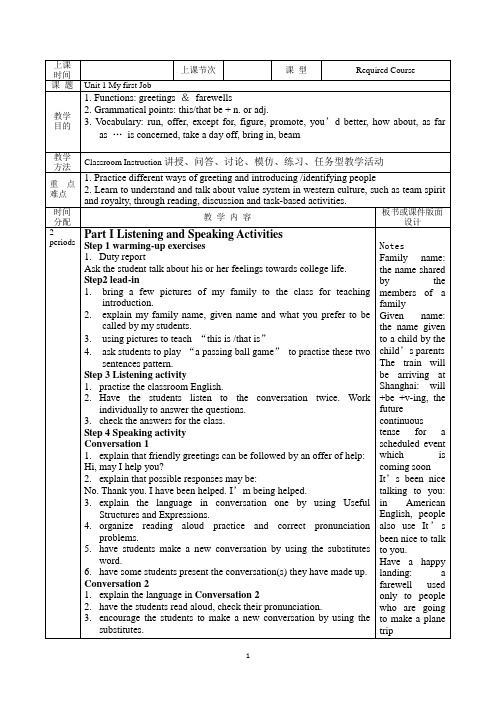
1.bring a few pictures of my family to the class for teaching introduction.
2.explain my family name, given name and what you prefer to be called by my students.
Step 6 What are they for?
1.have the students work in pairs. One reads the actual words spoken and the other matches them with the functions.
2.check the answer for the students
Part 2 Reading Comprehension and Language Activities
Step 1 warming-up exercises
1.have the students translate the proverb into Chinese“A good beginning is half the battle”.
2.…offer to reshine the shoes if the customer…
reshine:v. to shine again
re-: verb prefix, again
re- + print : reprint
re- + start: restart
re- + sell: resell
offer
1)v. to say what one is willing to pay, give or exchange (for sth.)
大学体验英语综合教程1_第三版_Unit_1_电子教案
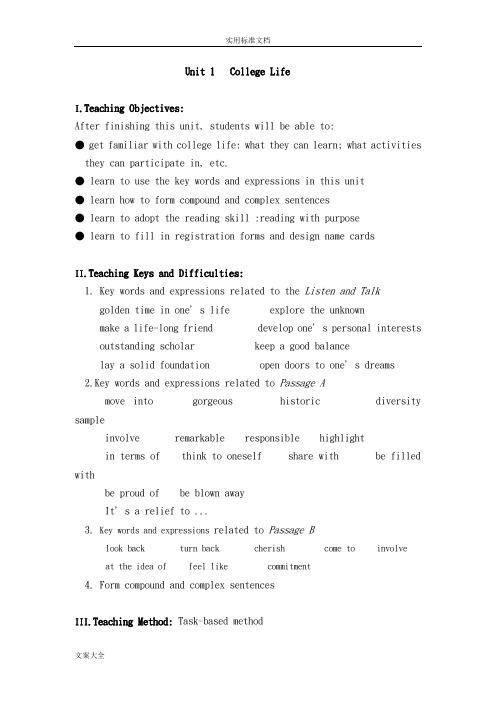
Unit 1 College LifeI.Teaching Objectives:After finishing this unit, students will be able to:● get familiar with college life: what they can learn; what activitiesthey can participate in, etc.● learn to use the key words and expressions in this unit● learn how to form compound and complex sentences● learn to adopt the reading skill :reading with purpose● learn to fill in registration forms and design name cardsII.Teaching Keys and Difficulties:1. Key words and expressions related to the Listen and Talkgolden time in one’s life explore the unknownmake a life-long friend develop one’s personal interestsoutstanding scholar keep a good balancelay a solid foundation open doors to one’s dreams2.Key words and expressions related to Passage Amove into gorgeous historic diversity sampleinvolve remarkable responsible highlightin terms of think to oneself share with be filledwithbe proud of be blown awayIt’s a relief to ...3. Key words and expressions related to Passage Blook back turn back cherish come to involveat the idea of feel like commitment4. Form compound and complex sentencesIII.Teaching Method: Task-based methodIV.Suggested teaching procedures and class activitiesSession 1 (3 periods)Introduction of college life (1 period)1.Your course: compulsory/required course and optional/elective courseCompulsory/Required course, studying for a degree or diploma;Optiona/Elective course, not studying for a degree or diploma.2. Your name: Freshman, Sophomore, Junior, Senior3. College students’ psychological changing (in my opinion)Freshman: Don’t know you don’t know yourself.Sophomore: Don’t know you know yourself.Junior: Know you don’t know yourself.Senior: Know you know yourself.4. Education: Junior college student; Undergraduate studentPostgraduate{master student and doctor student}5. DegreeBachelor degree; Master degree; Doctor degree6. Teacher’s professional titleInstructor or lecture; Associate professor; Professor 7. Some other aspects of college lifeCertifications (CPA,CET 4/6, the Certificate of the Primary Computer Examination ,etc.)Activities ( martial arts ,etc .)Leisure Time ( Library, Dormitory, Sleeping, Seeing a film , Playing computer, Etc. )( introduce the contents)Section I Listen and Talk (2 periods)Step 1 Lead in (25 mins)1.Warm up questions:What’s your first impression of our school?What do you expect to learn in your college?What are your main activities in college life? Can you describe them?2.Listening: (Listen to the passage and fill the missing words in theblanks. Listen three times)Keywords:spend, golden, explore, experience, lifelong, various, develop, scholars, lay, open3. Words and Phrasesgolden: adj. 黄金的,宝贵的lifelong: adj. 终生的,一生的Opportunity 机会、机遇Outstanding scholar 杰出的学者keep a good balance: 保持良好的平衡lay a solid foundation: 打下坚实的基础4. Answer: 1.explore 2.experience 3.various 4.develop5.scholarsy5. Talking about the pictures or say something about your college life(Pair-work)Keywords: discuss, meet, chat, communicateStep 2 Dialogues (40 mins)1. Listen to the two sample dialogues and try to answer some questionsDialogue 1 Meeting on CampusWho is Mike?What help did Mike need?Who is Dr. Wang?Dialogue 2 At the Registration OfficeWhere are the two speakers?What are they doing?Which elective course does Mike choose at last?2. PracticeRead two dialogues in pairs (pair work)3. Learn some useful phrases and expressions:have been looking forward to doing sth.: 一直希望着I’m here to see whether you need any help. 我能帮你什么忙吗?show sb. the way: 带某人去both … and …: 既有…也有…drop out: give uprefund: pay backfill in the forms: 填表格4.New words and expressionsStep 3 Communicative Tasks (25 mins)Work in pairs and act the dialogues to the whole class.Task 1: Meeting with a foreign student and talking about studies Tips: (P7 )Glad to meet you.Where are you from?Which are you in?I’m majoring in …About your major name: A ccountantTask 2: Helping a foreign friend select his course at the registration officeTips: (P7)What’s your favorite subject …What course do you like most?Insightful, informative, boring, practical, fantastic, be interested inStep 4 Assignment for this session1. Pair taskRole-play Communicative task 2 according to the topic and the situationof the task. Performance in class is expected in the next class.2. Individual tasks1) Learn the useful words & phrases of Liatsen and Talk.2) Listen to and read Passage A aloud for at least two times.3. Group tasks1) Do the pre-reading exercise of Passage A in groups.2) Analyze the organizing structure of Passage A in groups.Session 2 (4 periods)Lexical preparation for Passage AStep 1 Pre- reading Tasks (15 mins)1.Culture notes:The Introduction of Harvard UniversityHarvard is located in Cambridge, Massachusetts, on the eastern coast of the United States. Harvard University, which was established in 1636, is the oldest institution of higher learning in the United Sates. Most of Harvard University’s campuses are located in Cambridge and Boston, Massachusetts, on the eastern coast of the United States of America.It has about 2 100 faculty members and more than 10 000 academic appointments in affiliated teaching hospitals. Harvard University is made up of 11 principal academic units — ten faculties and the Radcliffe Institute for Advanced Study. The ten faculties oversee schools and divisions that offer courses and award academic degrees. There are about 21 000 students — about 6 700 undergraduates and 14 500 graduate and professional students.Seven presidents of the United States —John Adams, John Quincy Adams, Theodore and Franklin Delano Roosevelt, Rutherford B. Hayes, John Fitzgerald Kennedy and George W. Bush — were graduates of Harvard. It has produced more than 40 Nobel laureates.Shopping WeekShopping Week is a special time for freshmen at college to sample classes, which could help them decide which courses they are going to take in the beginning of a school year.2. Lead-in questions:①What do you expect to learn as a freshman?Answer: (The answer may vary. )The most important thing is to learn how to learn.②How do you guess the author of the passage would feel about her first week at Harvard, a world-famous university?Answer: (The answer may vary. )The student thought that her first week at Harvard was very impressive, because the new college life would be a once-in-a-life journey for her, at a world-famous university in particular.Step 2 While- reading Tasks (75 mins)Reading Task 1:Read the text as quickly as possible and try to find the answer to the following questions:1).What did the author think of being a freshman at Harvard? Answer: She thought it was very pleasant and lucky to be a freshman at Harvard.2).How did the author get along with her roommates?Answer: She got along with them very well and they had helped her a lot.3).What difficult decisions did the girl have to make in the “Shopping Week”?Answer: She had to decide what classes to take.4.)What did the author think of eating on campus for a freshman at Harvard? Answer: Eating is one of the highlights for freshmen at Harvard. 5).How did the author appreciate meeting the other students at Harvard? Answer: Appreciating and being surrounded by so many gifted people was what had made her first week at Harvard a truly priceless experience. Reading Task 2: Chart on P 9Reading Task 3 :Skim the text and try to find the main ideaMain idea: The first day is gorgeous for a freshman at Harvard. The authorlived with four girls, who helped her through the difficult adjustment process. Freshmen at Harvard can sample classes during “Shopping Week”. Eating is one of the most important and enjoyable highlights for studentsat Harvard. The best assets for Harvard students according to the authoris to have met so many gifted people.Step 3 Exploring vocabularyStudents work in groups to pick out the sentences containing the key words or expressions displayed on PPT from Passage A and discuss how they are used in context.The teacher may assign each group two or three words or expressions.Key words and expressions on PPT:move into gorgeous historic diversity sampleinvolve remarkable responsible highlightin terms of think to oneself share with be filledwithbe proud of be blown awayStep 4 Further studyWords for further study1.The day a freshman moves into Harvard Yard is said to always be a gorgeous one and this was certainly true of my first day at Harvard.It is always said that the day a freshman starts college life in Harvardis very exciting and pleasant and the author thought this was also trueof her own first day at Harvard.move into: to start living inExamples:She decided not to move into the new apartment until she had finished decorating.We’re excited to move into a new home.Harvard Yard: the main campus of Harvard Universitygorgeous: extremely pleasant or enjoyableExamples:John said that he met a gorgeous girl at the party last night.Do you want to sample some of the jam? It is gorgeous.2.historic: famous or important in historyExamples:Today is a historic occasion for our country.It was difficult for the enterprise to expand during a time of historic change.cf. historical: connected with the past, or connected with the study of the pastExamples:Can you tell me something about the historical background to the Civil War?They went to Yuelu Academy to do some historical research. Notes: Historic is usually used to describe something so important that is likely to be remembered, while historical usually describes something that is connected with the past or with the study of history, or something that really happened in the past.3.I gazed out the window at this captivating scene and thought to myself “No freshman should be so lucky!”.I looked out through the window of the car at this fascinating scene and had a thought in my mind: “I should be the luckiest freshman!” think (sth) to oneself:to have a thought in one’s mind, but not tell it to anyoneExamples:After listening to the professor’s suggestion, Jane thought to herself,“I’m sure I will make it.”He gazed out the window at this boundless grassland and thought tohimself, “What a beautiful scenery it is!”4.I’m sharing a suite w ith four other girls that has four single bedrooms and a large common room.I am living in a suite with other four girls, and the suite consists of four single bedrooms and a large common room.share with: to use, participate in, enjoy, receive, etc., jointly Examples:The two chemists shared the Nobel prizeKate is a very generous girl, for she always shares what she has with others5.We’re all completely different in terms of background, ethnicity, religion, and interests — we reflect the diversity that Harvard is so proud of.T he other four girls and I am quite different in terms of background, ethnicity, religion, and interest, which is refl ection of the variety that Harvard is proud of.in terms of: with regard to the particular aspect or subject specified Examples:He’s quite rich in terms of money, but not in terms of happiness.It is difficult to express it in terms of science.diversity: a range of different people or things; varietyExamples:Diversity is conducive to the learning environmentWe should get a thorough understanding about the cultural diversity of the United States.6.During this first week, it’s a relief to have four girls I can call friends and that can help me through this adjustment process which is quite difficult at times.In the first week, I am lucky to have the four girls that I can callfriends. It is them who helped me through this adjustment process, which is rather hard sometimes.it is a relief to (do sth): to have a feeling of comfort when something frightening, worrying or painful has ended or has not happened Examples:I hate to say it, but it was a relief to have him out of the house.It is a relief to see you get through those terrible days.7.Thankfully, Harvard allows freshmen to sample classes during “Shopping Week”.sample: to try an activity, go to a place etc. to see what it is like Examples:We sampled the stuff and found it satisfactory.I sampled several classes and decided to choose four of them this semester.8. Which to get involved in?get involved in: to take part in an activity or eventExamples:I got involved in a quarrel about the priceHe regretted that he got involved in that matter.9.... but it’s where we eat that’s truly remarkable.remarkable: unusual or surprising and therefore deserving attention or praiseExamples:She is remarkable for her sweet temperWhen we went swimming last summer, we saw the most remarkable sunset at the beach.10. Our dining hall is more like a church or a museum than a cafeteria:The dining hall is like a church or a museum rather than a cafeteria.11. ... and is filled with statues and portraits of famous figures from Harvard’s past.be filled with: to become completely fullExamples:After reading his poems, I was filled with admiration.I didn’t go last time because my hands were filled with the paper work.12.All of these first-week experiences will make great life-time memories but the best assets Harvard has offered me thus far have been the other student s I’ve met:The first week experiences will make a life-time impression on me, but the most valuable thing Harvard University has offered me so far has been the students I have met on campus.13. I’m blown away!be blown away: to be extremely impressedExamples:Students were blown away by his inspiring speech.Everyone I told that story to, I mean everyone, is just blown away.14. One week down, four more years to go —I can’t wait: One week had passed, and the author was looking forward to the coming four years.Step 5 Assisment1. Individual tasks1) Write a paragraph describing the most unforgettable during the pastweeks( The students are expected to use the words and expressions learned in the passage)2) Do Exercises 4-7.3)Retell Passage A with the key words.2. Group TaskAnalyze the organzing structure of Passage B in groups.OPTIONAL (1 period )Passage B Wish for the Freshman Year (4 periods)Step 1 Pre-reading Tasks (15 mins)1.Greetings and a brief revision(individual work)Ask students present their dialogues according to “Talk About It”2.Lead-in questions:How do you think you’ll feel after four years of college?3.Culture NotesGrading System in the U.S.Most colleges use letter grades like A, B, C, D, F, and some use plus or minus like B-or C+. To computer students’ averages they say A=4, B=3, C=2, D=1, F=0. It takes an average of 2.0 to graduate. Grades of F must be repeated to get credit. Most students take 5 or occasionally 6 courses per semester, and most courses are 3 credits. It usually takes between 120 and 130 credits to graduate. A few colleges use numerical grades instead of letters. If so, most likely A=90, B=80, C=70, D=60, F=50, but this may be up to the professor.Step 2 While-reading Tasks (75mins)1.Read the text as quickly as possible and try to find the answer to thefollowing questions:1)Why was the author less eager to graduate than his classmates?2)What was he thinking about while he was taking a walk on campus?3)What is the main idea of the passage?2. Read again and find the key words from each paragraph.Para.1: introductory paragraph. Author’s attitude (envy)Para 2: sophomore year (remarkable year)Para 3: soul-searching (reminiscing)Para 4: queasy feelingPara 5: a torture ideaPara 6: concluding paragraph. Cherish3. Language points:1)look back (on sth.): to review the past; to think of what has happenede.g. Looking back on the past, I can now see that I have wasted somuch of my precious time.He looks back at the four years of college with satisfaction.2)schedule of classes:a timetable on which class times are marked out 课表3)envy:n. a feeling you have towards someone that you wish you couldhave the same thing or quality they havev. to feel envy of sb. or at sth.4)turn back: to (cause to) returne.g. We’d better turn back. It’s getting dark.5) remarkable: worth mentioning; unusuale.g. a remarkable person/feat/event/career/talent/achievementShe is remarkable for her sweet temper.6)come to: to learn to, to grow toe.g. He had come to like the city better after living here for three years.7) involve: to have as a part or resulte.g. Taking the job would involve living abroad.8)find oneself doing…e.g. I find myself reading alone in the library.9)reminisce (about sth/sb): to talk or think about past experience,esp. pleasant onese.g. The two friends were reminiscing about their youth.10)at the idea of: at the thought ofe.g. Smiles boarded on my mother’s face, she just couldn’thelp it at the idea of the family reunion.11) queasy feeling: an uneasy feeling12)feel like: to have a wish for; wante.g. It is such a fine day. I do feel like going out for a picnic.13) contemplate: to think deeply and thoughtfullye.g. The doctor contemplated the difficult operation he had to perform.14) torture: n. the act of causing someone sever physical paine.g. It was sheer torture to have him play the violin so badly.The interview was sheer torture from start to finish. 15) cherish: to care for tenderly; love; to keep a feeling deeply and firmly in minde.g. The old man cherished the girl as if she were his daughter.Children need to be cherished.4. some new words and expressionsStep 3 Post-reading Tasks (45mins)1.Summarize the passageSummary: College is safe laboratory in which to experiment with new things. There are no parents around to control you or make all decisions for you. But most of the decisions you make don’t have as great a risk as they will have after college. Being a student is a real career but only a temporary one. Teachers can give some guidance without being either parents or bosses. Classmates can set either a good or a bad example, and you can learn to tell the difference. What happens outside the classroom is an important part of the college experience. Students should cherish all of this like the student in the story, because they may never have such and opportunity again.2.Check the answers of Ex.12, 13 and 14Step 4 Assignments1.Read Passage B.2.Review the words and phrases in Passage BSection III Write and Produce (2 periods)Step 1 Revision (10 mins)Dictation of words and phrases in P assage A and BStep 2 Grammar (35 mins)1.Forming compound and complex sentencesSimple sentence: Birds sing. S + VCompound sentence:It was late, so we went home.S + V S + VHere “so” is a conjunction.2.Conjunctionsthat, before, whether, if, although, because, as long as, as soon as, since, after, who, which, whom, those, why, where, how, when3.Do Ex.17 and 18 and check the answers.4.Pair works. Do Ex.19 in pairs.Step 3 Practical Writing (40 mins)1.Registration FormsThink about it: What is registration form?How to fill registration form?2.Work in pairs. Make a registration form for your friend. CardsWhat’s name card?eful abbreviationsAdd. Tel. Email O.H. P.C. Fax5.Do Ex. 20 and check the answer (personal work)Step 4 Assignments (5mins)Ex.21. Design a business card.。
综合英语教程1 邹为诚 课后翻译
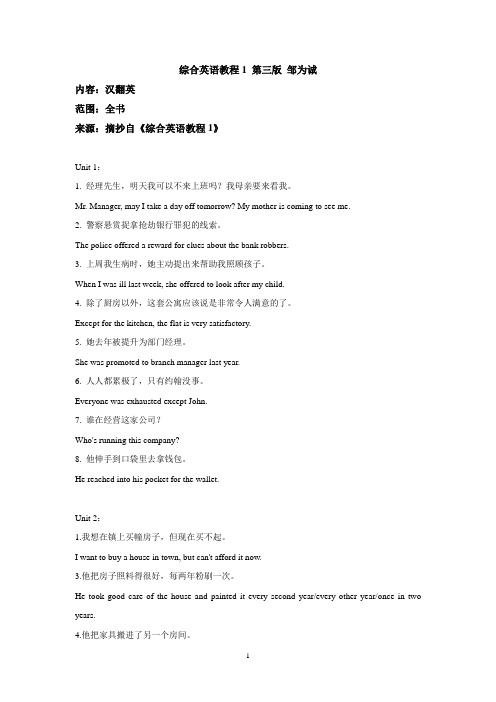
综合英语教程1 第三版邹为诚内容:汉翻英范围:全书来源:摘抄自《综合英语教程1》Unit 1:1. 经理先生,明天我可以不来上班吗?我母亲要来看我。
Mr. Manager, may I take a day off tomorrow? My mother is coming to see me.2. 警察悬赏捉拿抢劫银行罪犯的线索。
The police offered a reward for clues about the bank robbers.3. 上周我生病时,她主动提出来帮助我照顾孩子。
When I was ill last week, she offered to look after my child.4. 除了厨房以外,这套公寓应该说是非常令人满意的了。
Except for the kitchen, the flat is very satisfactory.5. 她去年被提升为部门经理。
She was promoted to branch manager last year.6. 人人都累极了,只有约翰没事。
Everyone was exhausted except John.7. 谁在经营这家公司?Who's running this company?8. 他伸手到口袋里去拿钱包。
He reached into his pocket for the wallet.Unit 2:1.我想在镇上买幢房子,但现在买不起。
I want to buy a house in town, but can't afford it now.3.他把房子照料得很好,每两年粉刷一次。
He took good care of the house and painted it every second year/every other year/once in two years.4.他把家具搬进了另一个房间。
- 1、下载文档前请自行甄别文档内容的完整性,平台不提供额外的编辑、内容补充、找答案等附加服务。
- 2、"仅部分预览"的文档,不可在线预览部分如存在完整性等问题,可反馈申请退款(可完整预览的文档不适用该条件!)。
- 3、如文档侵犯您的权益,请联系客服反馈,我们会尽快为您处理(人工客服工作时间:9:00-18:30)。
middle-aged, about forty. • She has short golden hair and light blue eyes. • My hometown is small and clean. • The day was hot and dusty. • The house was old, damp and smelly.
Toilet
sucker马 桶抽赌器
Snap circuits儿童
电子线路插板,可以 制作电子玩具
Robot vacuum
cleaner自动真 空吸尘器
Towel rack家
用毛巾架
Weather station
电子天气表
Poems
My Mum
My mum has dyed auburn hair,
rhaysmeinntgenpcaettearnnds.aThe
rhsyemntienngcpeamttearynriunnMy
She’s always washing, ironing, cleaning Until the house is really gleaming. She gets up at five—that’s her rule—
It’s hard to believe she once was fair. describes her mum’s
She has her hair set every Sunday, physsMitcAaaanllnzifnaeyeaptumoreeamy snohtacvoerrelate
But it’s always flat again by Monday.
Part I Communicative activities
Book 1-Unit 3
Notes to Conversation 1
Welcome aboard: a colloquial expression for greeting a new member
you guys : you two people guy:generally referring to a male in its
• If you want to know something about someone's work, you may ask:
Where do you work? What do you do?/What do you do for a living? What is your line of business? What is your job/occupation? What does your father's job involve? /What's your father? What is your routine work?/What do you do exactly every day? Could you tell me something about your job? What made you decide to become a teacher?
Common Answers:
• I work for Anderson office. • I'm a tour guide. • I'm a doctor. • I'm a secretary. • He is the headmaster of our school. • He is a gardener. • I find a part-time job in a business company. • I'm looking for a better job. • My job doesn't require special skills. • To be a housewife is so boring.
• You may describe objects like this: • A: Which apple do you like? B: The red one. • A: What did your father look like? B: He was
short and fat. • A: How old is your English teacher? B: He is
Pictures about listening 1:
Digital thermo-hydrometer Crimper pliers压钳 室内电子温度表、湿度表
Electronic bookstand可以放在
桌子或床上的书架
Lego儿童的一种玩具,可以拼插
Toilet dishes搞笑的艺 术游戏用品,把吃饭 的盘子做成马桶形状
Book 1-Unit 3
Listening 1
• If you describe an object (someone or something), you say what sort of thing it is (what kind of person he or she is), or what they are like, such as its size, color or shape. The simple rule is: Size + Color + Material, e.g. a large white paper bag/ short golden hair/ light blue eyes.
